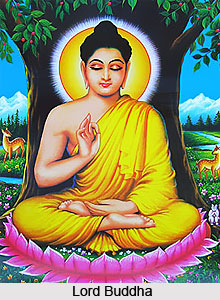 Buddhism died a natural death in India. The violent extermination of Buddhism in India is legendary. Buddhism and Brahmanism approached each other so much that for a time they were confused and ultimately became one. Slow and silent absorption, indifference, and not priestly fanaticism and methodical destruction were the causes for the decline of Buddhism in India. The vital reason for the disappearance of Buddhism from India is the fact that it became ultimately indistinguishable from the other nourishing forms of Hinduism, Vaishnavism, Shaivism and Tantrik belief. The old Buddhism, which denied the very being of God, offered no hope of human immortality and looked upon all life as misery, love of life as the greatest evil, and the end of man as the extinction of all desire, lost its power. Buddhism was choked by the mass of superstition, selfishness and sensuality which surrounded it.
Buddhism died a natural death in India. The violent extermination of Buddhism in India is legendary. Buddhism and Brahmanism approached each other so much that for a time they were confused and ultimately became one. Slow and silent absorption, indifference, and not priestly fanaticism and methodical destruction were the causes for the decline of Buddhism in India. The vital reason for the disappearance of Buddhism from India is the fact that it became ultimately indistinguishable from the other nourishing forms of Hinduism, Vaishnavism, Shaivism and Tantrik belief. The old Buddhism, which denied the very being of God, offered no hope of human immortality and looked upon all life as misery, love of life as the greatest evil, and the end of man as the extinction of all desire, lost its power. Buddhism was choked by the mass of superstition, selfishness and sensuality which surrounded it.
Mahayana Buddhism was unable to acquire the prestige of primitive Buddhism, and so proved weak and vacillating in its conflicts with Brahmanical religion. Moreover, it grew weaker as it spread wider. It had developed elaborate superstitions which dissatisfied the people at large. Throughout its conquests it did not aim at the suppression of other religions, but tried to suffuse them with its own ethical spirit. It accommodated itself to all men and to all time. With the result that paradises were added and animistic ideas introduced. This tendency of compromise was its strength as well as its weakness. The Mahayana metaphysics and religion in fact was synonymous with the Advaita metaphysics and theism. Hinayana on the other hand with its more ascetic character, came to be regarded as a sect of Shaivism. Buddhism found that it had nothing distinctive to teach. When the Brahmanical faith inculcated universal love and devotion to God and proclaimed Buddha to be an avatar of Lord Vishnu, the death knell of Buddhism in India was sounded.
Buddhism repeated the merits as well as the faults of Hinduism. The hand of the immeasurable past, with its congenial fancies and inherited beliefs, again took hold of the country, and Buddhism passed away by becoming blended with Hinduism.
Buddhism failed to bring to India a real spiritual deliverance in spite of the fact that it laid powerful emphasis on a severely simple life of pure goodness. Early Buddhism provided a rallying centre for revolting individuals. The Hinayana by its exaggerations betrayed the central weakness of Buddhist systems. The Mahayana, in trying to correct the deficiency of the Hinayana, went to the other extreme and contradicted the spirit of Lord Buddha by allowing all sorts of superstitions to interfere with spiritual life. Uncompromising devotion to the moral law is the secret of the strength of Buddhism and the neglect of the mystical side of man`s nature caused its failure.









